 Personal plug: A book I worked on last summer, the second edition of Robert C. Williams’ The Historian’s Toolbox: A Student’s Guide to the Theory and Craft of History, has just been published. As the intro notes, I “helped add sections on the internet, event analysis, public analysis, public history, oral history, and material culture.” But, even before those additions, Williams’ book made for an excellent classroom tool for teaching the basics of historiography to undergraduates. I hope it finds some use.
Personal plug: A book I worked on last summer, the second edition of Robert C. Williams’ The Historian’s Toolbox: A Student’s Guide to the Theory and Craft of History, has just been published. As the intro notes, I “helped add sections on the internet, event analysis, public analysis, public history, oral history, and material culture.” But, even before those additions, Williams’ book made for an excellent classroom tool for teaching the basics of historiography to undergraduates. I hope it finds some use.
Category: History
Harding Coolidge Hoover et al.
Sorry it’s been quiet so far this week. Not only have I spent most of the past few days preparing a guest lecture for a friend’s class (delivered this morning, on “The Political World of the 1920’s,” went fine), but the Internet connection at the home office has been acting ornery of late. Seems to be up now, though, so I had best link away.
Branch on Clinton.
“‘I’m not calling this a biography of Clinton or a history of the administration,’ Mr. Branch said in a telephone interview from Baltimore, where he lives. ‘It is what it was like to live through it that way, sitting alone with him, talking about the presidency as he saw it, right in the moment.‘” Pulitzer-Prize winning King historian Taylor Branch announces a forthcoming book based on intimate conversations with Bill Clinton over the course of his presidency. “David Rosenthal, the publisher of Simon & Schuster, said the material ‘is wide-ranging, largely unguarded and gives tremendous insight into the thought processes and real-time concerns of a sitting president.’“
Echoes of Aguinaldo?
“It was a war that the United States had not planned, and did not expect, to fight. It was a war in which the superiority of American civilization was supposed to bring grace to a foreign people. It was a war that the United States seemed to win quickly and with ease, but that somehow did not end.” Over at Slate, historian David Silbey ponders what the Phillippine War of 1899-1902 tells us about Iraq. Silbey’s emphasis on political counterinsurgency seems sound, but, given that the Philippines wasn’t on the verge of a sectarian civil war at the time, I’m not sure his strategy for victory plays out in Baghdad, particularly at this late date.
AARRRRRRGGG!!
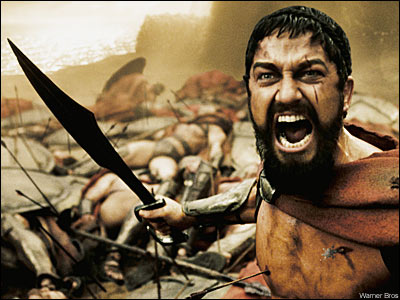
Ever since The Matrix came out of nowhere in March of 1999 and proved that genre audiences would pack the seats any time of year, not just in summertime, the February/March comic-book tentpole release has become a staple of the fanboy film calendar (Think Blade II, Constantine, Sin City, V for Vendetta.) This year, as you probably know, the big event was Zack Snyder’s adaptation of Frank Miller’s 300, which has been getting good buzz ever since its Comic-Con test footage and very impressive (and still very watchable) trailer last year. Well, I gotta say, I did everything I could to get all suitably double-Y aggro’ed for Snyder’s trip to Sparta: I went to the midnight IMAX showing with the fanboy nation, had Greek food for dinner (ok, a coincidence) and downed a few beers beforehand, tossed out 600 sit-ups and randomly killed a hobo — but, even then, 300 turned out to be sadly underwhelming. It looks great, no doubt — with its carefully calibrated colors and artfully spurting viscera, it looks even more Frank Millerish than Sin City did, and there are definitely a couple of images that bypass all thought and directly engage the reptilian part of the brain. But, even taken on its own terms, there’re too many groaners and too much filler here, and its attempts to be somber border on the laughable. I suspect 300 will sell a lot of HD-DVD players in the very near future, and for good reason, but it ultimately makes for a better music video than it does a movie.
The story is old, I know, but it goes on (usually in a David Wenham voiceover): In the ancient warrior city-state of Sparta, presided over by the robust, strapping King Leonidas (Gerard Butler), the men are men, the women are women, and those stunted weaklings born without a killer six-pack are picked off at a very early age. But, alas, this militarist utopia finds itself threatened by the global ambitions of the — clearly not manly enough — Persian God-King Xerxes (Rodrigo Santoro), who asks only that Leonidas and his people submit to his divine benevolence. Submission? You must be joking. So, while his beautiful Queen (Lena Headley) negotiates with the Spartan Senate in a number of insipid let’s-take-a-meeting scenes straight out of The Phantom Menace, Leonidas takes 300 of his best, least-clad warriors to the Hot Gates, where he and his ilk must fight off — without benefit of armor, mind you — wave after wave of Xerxes’ elite assassins: the fearsome Persian Immortals, known mainly by their grinning demon masks and matching Ahmadinejad windbreakers.
Ok, that gag aside, and despite what you may have heard, there’s really not that much allegorical grist in 300. I mean, you could very easily call out the political and racial subtext of the film: very Anglo-Saxonish looking Greeks beating down evil brown and black folk, in order to defend Spartan freedom(?) against the “mysticism and tyranny” of the Asian hordes. (After all, writer Frank Miller is the same guy who felt it necessary to sic Batman on Al Qaeda.) Or, you could fault 300‘s unabashed reveling in blood, guts, and glory: Faramir won’t shut up in this movie, and yet there’s nothing at all here akin to his opening lines in his last crusade against Men of the East, The Two Towers: “His sense of duty was no less than yours, I deem. You wonder what his name is, where he came from, and if he was really evil at heart. What lies or threats led him on this long march from home. If he would not rather have stayed there in peace. War will make corpses of us all.”
In short, to say 300 is the anti-Letters from Iwo Jima is an understatement.
But, really, all of that is basically beside the point: the movie is way too shallow to merit any deeper readings. The inimitable, foul-mouthed Neill Cumpston hit the nail on the head: 300 is in essence a video game, with waves of easy-to-dispatch bad-guy mobs punctuated by the occasional mini-boss. And, besides, let’s be honest: All subtexts aside, I came to 300 — and if you saw the trailer, you did too — to chew gum and watch people kick ass, and I’m all out of gum. But, for every adrenaline-firing sequence of Leonidas and co. carving through baddies in slow-motion — one, you’ll know it when you see it, is pitch-perfect Frank Miller — there are several others where the movie just grinds to a halt, and we’re forced to watch Leonidas look angst-ridden or Queen Gargos engage in some cut-rate speechifying about freedom: “Freedom isn’t free,” “Freedom’s just another word for nothing left to lose,” etc. etc. ad nauseum. (And, alas, poor McNulty gets the shaft again: Dominic West gets a terribly-written, totally unnecessary part as a mustache-twirling politician/diplomat, which should tell you all you need to know about his role here — Like Sparta’s intrepid warriors really need his cut-and-run, Hans Blix pansy-ass screwing things up on the homefront.)
Still, for all of 300 pacing woes, dialogue groaners, and two-dimensional characters, I have to admit — it does have its occasional moments…usually when it drops all pretense and just lets its “Tonight, we dine in Hell!” freak flag fly. A sinuous oracle in flimsy gauze writhes ecstatically through a soothsaying as if underwater. The God-King Xerxes, his voice booming with inhuman authority (nice job, sound editing guys), rests majestically on his obscenely large throne stairs, making Leonidas an offer he can’t refuse. Persian ships are rent asunder by the stormy wrath of Poseidon, as Greece’s warriors roar with approval in the rain. In these moments, and at others, such as when Xerxes unleashes his menagerie of rhinos and elephants against the 300, or when the Spartans first encounter the Asians’ arcane magick of gunpowder, Zack Snyder’s film settles into a big, dumb, loud, and rousingly enjoyable groove. Alas, 300 can only sustain that intensity for minutes at at time, and for the rest of the run, it’s not so enjoyable. Too bad — I get the sense there’s probably a really amazing half-hour short-film in here somewhere. As it is, 300 feels disappointing, and makes me wonder if Snyder has the wherewithal to do Alan Moore’s The Watchmen justice.

Karl’s Truman Show.
The wheels may have come off the Bush bandwagon several months ago, but that’s not stopping Karl Rove from trying to finesse Dubya’s place in the history books. And, like his boss, Karl seems to be attempting the Truman route: “In the West Wing interview, Rove adopted a longer view, citing the policy of containment of the Soviet Union, adopted by Truman in the 1940s and then embraced by a succession of presidents despite initial misgivings, as reason to believe history may offer a kinder assessment of the durability of Bush policies and institutional changes.” Hmm. When it comes to the war on terror, somehow I doubt dropping the ball in Afghanistan to prosecute a badly-bungled war of choice in Iraq is going to look any better to future generations. Just a hunch.
Sign of the Beast.
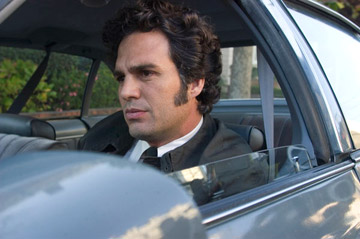 More a straightforward police procedural than the type of visually kinetic extravaganza one might expect from the director of Se7en and Fight Club, David Fincher’s Zodiac, which I saw on Friday, is a slow-moving but generally effective film. I confess to having very little interest in the story of the Zodiac killer, or in serial killer movies in general. Still, I found Zodiac to be a somber and engaging character study of the cops, journalists, and suspects caught up in the hunt for San Francisco’s most famous murderer, and a moody meditation on how, as months yield to years without a definitive answer, the long, tiring search for truth comes to haunt and drain their lives away. It may basically play like a seventies throwback Law and Order for most of its run, with occasional flourishes from The Wire, but Zodiac is still a worthwhile film, and one that marks a welcome rebound for Fincher after the relatively uninspired Panic Room. It’s good to see his sign rising once again.
More a straightforward police procedural than the type of visually kinetic extravaganza one might expect from the director of Se7en and Fight Club, David Fincher’s Zodiac, which I saw on Friday, is a slow-moving but generally effective film. I confess to having very little interest in the story of the Zodiac killer, or in serial killer movies in general. Still, I found Zodiac to be a somber and engaging character study of the cops, journalists, and suspects caught up in the hunt for San Francisco’s most famous murderer, and a moody meditation on how, as months yield to years without a definitive answer, the long, tiring search for truth comes to haunt and drain their lives away. It may basically play like a seventies throwback Law and Order for most of its run, with occasional flourishes from The Wire, but Zodiac is still a worthwhile film, and one that marks a welcome rebound for Fincher after the relatively uninspired Panic Room. It’s good to see his sign rising once again.
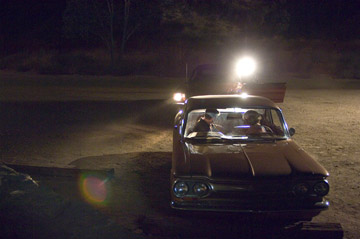 After the first of many impressive establishing shots of San Francisco, set to some spooky post-psychedelic pop ditty of the era, Zodiac begins on July 4th, 1969, with what feels like both a classic urban legend and a recipe for disaster — two young people flirting and fumbling at a dark and abandoned Lover’s Lane. Only this story is true, and soon enough, the Zodiac has struck for the second time, leaving one dead and another terribly wounded in his wake. Showing a penchant for publicity that will make him a household name in the Bay Area over the next few years, the Zodiac sends both boastful and encoded message to several major newspapers. These pique the interest of — among others — a hard-drinking, hard-living writer on the cop beat (Robert Downey, Jr.), a nebbishy cartoonist with a knack for puzzles (Jake Gyllenhaal, playing the author of the book on which the film is based), and two peace officers (Mark Ruffalo, Anthony Edwards) assigned to track down this preening sociopath before he strikes again. For the next few years, we follow each of these fellows as they attempt to pin down the identity of the elusive killer: negotiating bureaucratic snafus, parsing encrypted texts, and, yes, hitting the archives like good, little researchers. But the trail of the Zodiac exacts a heavy toll, and as the Age of Aquarius fades into the Reagan era, each of these men leave the decade scarred by their quest, some irreparably. And still, somewhere out there, the Zodiac lurks…
After the first of many impressive establishing shots of San Francisco, set to some spooky post-psychedelic pop ditty of the era, Zodiac begins on July 4th, 1969, with what feels like both a classic urban legend and a recipe for disaster — two young people flirting and fumbling at a dark and abandoned Lover’s Lane. Only this story is true, and soon enough, the Zodiac has struck for the second time, leaving one dead and another terribly wounded in his wake. Showing a penchant for publicity that will make him a household name in the Bay Area over the next few years, the Zodiac sends both boastful and encoded message to several major newspapers. These pique the interest of — among others — a hard-drinking, hard-living writer on the cop beat (Robert Downey, Jr.), a nebbishy cartoonist with a knack for puzzles (Jake Gyllenhaal, playing the author of the book on which the film is based), and two peace officers (Mark Ruffalo, Anthony Edwards) assigned to track down this preening sociopath before he strikes again. For the next few years, we follow each of these fellows as they attempt to pin down the identity of the elusive killer: negotiating bureaucratic snafus, parsing encrypted texts, and, yes, hitting the archives like good, little researchers. But the trail of the Zodiac exacts a heavy toll, and as the Age of Aquarius fades into the Reagan era, each of these men leave the decade scarred by their quest, some irreparably. And still, somewhere out there, the Zodiac lurks…
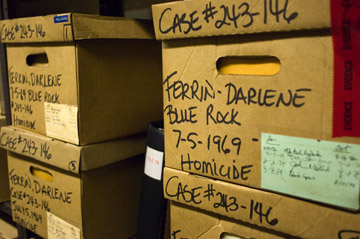 Its opening moments notwithstanding, most of Zodiac is concerned not with nasty serial killer exploits (although there are a few, such as a jarring afternoon picnic at the lake) but the ugly mechanics of the cops and journalists’ search, with all its circumstantial theorizing and bureaucratic gear-grinding. Some of this stuff, such as the memory-holes that arise between overlapping jurisdictions of various Bay Area law enforcement bureaus, would probably seem fresher if you’ve never watched The Wire, where police mismanagement and careerism is a central staple. (That being said, likable character actors like Elias Koteas, Donal Logue, and Zach Grenier spice up these scenes considerably.) But, other facets of the hunt still resonate, such as how multiple explanations pile up for a given clue with no real way to determine the correct one. The Zodiac’s symbol…is it a cross-hair, or was it stolen from a watch company, or is it the countdown from the opening of a film reel? Each answer seems like it must be the definitive one at different times, and, for the participants in this haunted search, the shifting interpretations grow increasingly maddening. The film is kind enough to give the audience something of a sense of closure at the end, but Zodiac is most intriguing when it leaves all doors open, and lets its characters get thrown about in the bruising wind that ensues.
Its opening moments notwithstanding, most of Zodiac is concerned not with nasty serial killer exploits (although there are a few, such as a jarring afternoon picnic at the lake) but the ugly mechanics of the cops and journalists’ search, with all its circumstantial theorizing and bureaucratic gear-grinding. Some of this stuff, such as the memory-holes that arise between overlapping jurisdictions of various Bay Area law enforcement bureaus, would probably seem fresher if you’ve never watched The Wire, where police mismanagement and careerism is a central staple. (That being said, likable character actors like Elias Koteas, Donal Logue, and Zach Grenier spice up these scenes considerably.) But, other facets of the hunt still resonate, such as how multiple explanations pile up for a given clue with no real way to determine the correct one. The Zodiac’s symbol…is it a cross-hair, or was it stolen from a watch company, or is it the countdown from the opening of a film reel? Each answer seems like it must be the definitive one at different times, and, for the participants in this haunted search, the shifting interpretations grow increasingly maddening. The film is kind enough to give the audience something of a sense of closure at the end, but Zodiac is most intriguing when it leaves all doors open, and lets its characters get thrown about in the bruising wind that ensues.
Roll, Jordan, Roll.
Schlesinger isn’t the only noted historian we’ve lost of late. A belated farewell to Winthrop Jordan, 1931-2007. (Via Cliopatria.)
The Age of Schlesinger.

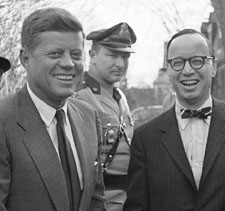

“History is a doomed enterprise that we happily pursue because of the thrill of the hunt, because exploring the past is such fun, because of the intellectual challenges involved, because a nation needs to know its own history. Or so we historians insist. Because in the end, a nation’s history must be both the guide and the domain not so much of its historians as its citizens.” Arthur Schlesinger Jr., 1917-2007. After Galbraith passed on last year, this seemed like it would soon be in the cards. Still, it’s a sad day. Update: Via Ted, David Greenberg weighs in on Schlesinger’s passing.
The Ties that Bind.
“‘It was probably the most shocking thing of my life…I couldn’t describe to you the emotions I have had…everything from anger to outrage to reflection to some pride and glory.” Genealogists discover a hitherto unknown historical (and perhaps genetic) link between Al Sharpton and Strom Thurmond: namely, in the dark days of slavery, Thurmond’s people owned Sharpton’s. “‘In the story of the Thurmonds and the Sharptons is the story of the shame and the glory of America,’ Sharpton said Sunday.“
